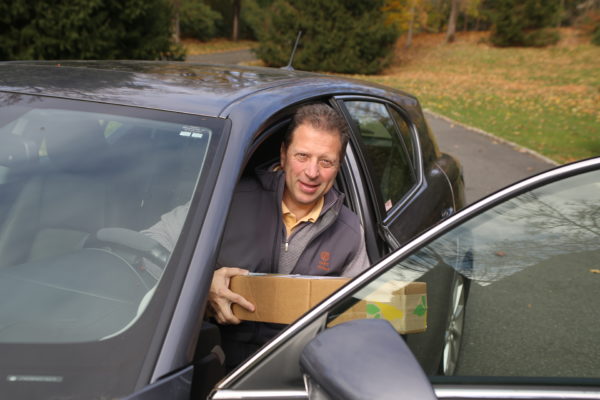Point Pick-up Technologies Inc. in Greenwich is aiming to turn the regional courier industry on its head with the recent launch of Point Pickup, a new same day-delivery app and website poised to become the Uber for courier and messenger services.
“Point Pick-up is electrifying a currently unwired local transportation network to create an efficient, easy-to-use and effective local delivery service,” said Tom Fiorita, CEO and founder of Point Pick-up. “The current market for same-day, local delivery services is fragmented, with heavy infrastructure players operating in densely populated areas and very few options in suburban or rural markets.”
The service works by matching the needs of any two parties ”” business to consumer, consumer to business or person to person ”” through a mobile application users download on their smartphones or by visiting the company”™s website. Local couriers who have undergone background checks wait on standby for orders, which they can then choose to fulfill.
With a business model based on the strategies of the emerging on-demand economy, the company is following in the footsteps of “disruptive” companies like Uber, Lyft, Airbnb and Task Rabbit, which have opened up old industries to an entirely new culture of consumers and workers.
“Point Pick-up is an unbundled service that is not tied to a transaction or to a specific actor, making it uniquely positioned to capture B2B, B2C, and C2C delivery demand, and ultimately disrupt the current $8.7 billion fragmented messenger and courier delivery industry and level the playing field for local retail merchants,” Fiorita said. Â “Every street retail store can now say they have local delivery, and we think that is really powerful for local communities especially when we are combating and really wrestling with folks just pressing a button and having it delivered to their door from an online source.”
The company is not only putting power back in the hands of Main Street retailers, but workers, as well.
Point Pick-up has already built a team of more than 200 drivers representing a cross section of the employment realities of the new economy. Drivers are predominantly part-time workers of diverse backgrounds ranging from college students to retirees and all walks of life, Fiorita said.
“We are seeing a whole new level of drivers coming out, people who have never done this before,” he said. “We are unearthing another layer of employment.”
The majority of Point Pick-up drivers use the service to generate supplemental income, but there are some who work fulltime and or combine the job with other on-demand economy jobs such as driving for ride-sharing services like Uber, Fiorita said.
Like other on-demand services, the company is also touting the ability of its workers to flexibly supplement their income.
Drivers have near total control over how they work from the times and locations they operate to how frequently they drive and even what they are willing to transport.
Drivers are never obligated to deliver orders unless they choose to and keep 80 percent of the fee. Standard fees are $10 for the first 3 miles between the pick-up and drop-off address and $1.50 extra for each additional mile. Oversized and overweight deliveries incur a 50 percent premium.
Fiorita estimates most drivers make between $50 and $80 per week depending on the frequency they choose to work.
“For some people that is another half a day of work,” he said. “You can be at your home on a Saturday ”” some college kid watching football with their phone on ”” they could see there is an order right near them, jump in their car and make 22 bucks and then they are back, they don”™t have to be out there waiting, idling to take advantage of supplemental income.”
The unofficial policy of the company is drivers will not transport anything with a heartbeat, which has drawn in freelancer drivers uncomfortable with transporting people, Fiorita said, but outside of animals and people just about anything is fair game.
“You go to Costco and buy a 45-inch TV but it won”™t fit in your car, picking up prints, shoes, clothes ”“ you drop your computer off for repairs or leave your phone somewhere, tailoring ”¦ picking up a platter of goods from a place that is 10 miles away ”” it is kind of endless,” he said.
Fiorita expects a somewhat slow adoption of the service as it will take time for merchants to become familiar and comfortable with the service, but like Uber and the expanding field of on-demand service providers, the service”™s application will become evident as it fills the gaps where old-guard service providers had been lacking for years, he said.
“We are basically standardizing the ability to for someone to have a delivery person at their fingertips anytime they want it,” he said.
Fiorita plans to expand the business to suburban Boston in December.
















